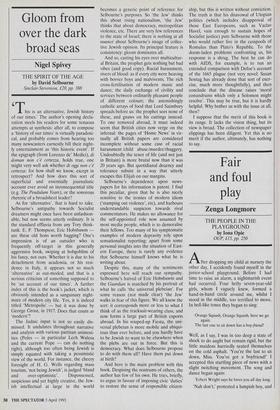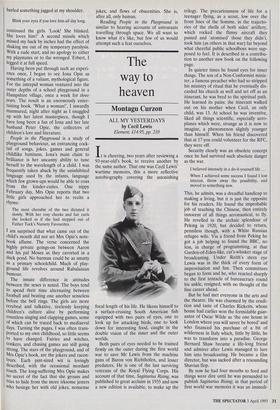Fair and foul play
Zenga Longmore
THE PEOPLE IN THE PLAYGROUND by Iona Opie OUP, £15, pp. 250 After dropping my child at nursery the other day, I accidently found myself in the junior-school playground. Before I had time to raise an alarm, a nightmarish event had occurred. Four hefty seven-year-old girls, whom I vaguely knew, formed a hand-in-hand circle around me, whilst I stood in the middle, too terrified to move. In bell-like tones they began to sing:
Orange Squash, Orange Squash, here we go again.
The last one to sit down has a boy-friend!
Well, as I say, I was in too deep a state of shock to do aught but remain rigid, but the little maidens hurriedly seated themselves on the cold asphalt. 'You're the last to sit down, Miss. You've got a boyfriend!' I accepted this startling piece of news with a slight twitching movement. The song and dance began again: 'Erbert Wright says he loves you all day long. `Nah don't,' protested a lumpish boy, and hurled something jagged at my shoulder. Blink your eyes if you love him all day long.
continued the girls. 'Look! She blinked. She loves him!' A second missile which missed my back by inches had the effect of shaking me out of my temporary paralysis. With a rude start, and no apology to either my playmates or to the wronged 'Erbert, I legged it at full speed.
Having been put through such an experi- ence once, I began to see Iona Opie as something of a valiant, mythological figure. For the intrepid woman ventured into the outer depths of a school playground in a Hampshire village, once a week for three Years. The result is an enormously enter- taining book. 'What a woman!', I inwardly murmured, night after night as I snuggled Up with her latest masterpiece, though I have long been a fan of Iona and her late husband Peter Opie, the collectors of children's lore and literature.
People in the Playground is a study of Playground behaviour, an entrancing cock- tail of songs, jokes, games and general childlike battiness. Iona's main claim to brilliance is her uncanny ability to tune herself to the wavelength of a child. I was frequently taken aback by the uninhibited language used by the infants, language which few grown-ups would be able to coax from the kinder-cuties. One nippy February day, Mrs Opie reports that two little girls approached her to recite a rhyme:
The most cherubic of the two dictated it slowly. With her rosy cheeks and fair curls she looked as if she had stepped out of Father Tuck's Nursery Favourites.
I am surprised that what came out of the child's mouth did not set Mrs Opie's note- book aflame. The verse concerned the highly private goings-on between Aaron and his pal Moses as they cavorted in a duck pond. No barman could be as smutty as a primary schoolchild. Much of play- ground life revolves around Rabalaisian humour.
The innate difference in attitudes between the sexes is noted. The boys tend to spend their time alternating between football and beating one another senseless before the bell rings. The girls are more cerebral and talkative, tirelessly keeping children's culture alive by performing countless singing and clapping games, some of which can be traced back to mediaeval days. Turning the pages, I was often trans- ported to my own childhood, so little seems to have changed. Fairies and witches, conkers, and chasing games are still going strong. The stars of the playground, and of Mrs Opie's book, are the jokers and racon- teurs. Each pint-sized wit is lovingly described, with the occasional mordant touch. The long-suffering Mrs Opie makes no secret of the fact that she groans and tries to hide from the more irksome jesters Who besiege her with old jokes, nonsense jokes, and flows of obscenities. She is, after all, only human.
Reading People in the Playground is similar to hearing accounts of astronauts travelling through space. We all want to know what it's like, but few of us would attempt such a feat ourselves.



















































 Previous page
Previous page